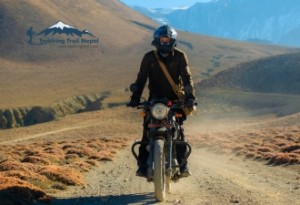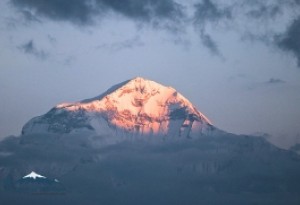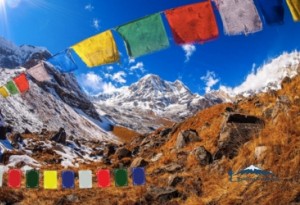Fitness Guide for Everest Base Camp Trek: Tips to Stay Fit, Healthy on EBC Trek
Everest Base Camp is a dream destination for many people around the globe. The breathtaking landscapes, panoramic views of numerous top ten highest mountains, and tranquility of the Khumbu region have won the heart of millions of travelers. To see stunning Himalayan sceneries, you have to trek through challenging terrain, dense alpine forests, and steep and rugged paths. And this requires good health and physical fitness along with a well-made Everest Base Camp Trek itinerary.
As famous and adventurous as Everest Base Camp Trek is, it is equally challenging, especially for beginner trekkers. You have to be well-prepared before embarking on the trek. There are a few things that you should prepare, and your body should know respectively for a smooth and successful trek.
- For Easy trekking like Short ABC Trek, Everest View Trek, Mohare Danda Trek, or Poon Hill trekking, Just good walking habit and strength is enough.
This blog is written to give you a fitness guide for Everest Base Camp Trek. You will also know the answers to all the questions, like Can I prepare myself for Everest trekking in my home? How do I prepare and train for the Everest base camp trek? and many others in this blog.
Altitude Training
During the Everest Base Camp Trek, you will be walking above 5,000 meters from sea level, which involves chances of altitude sickness. It is also known as acute mountain sickness, which occurs because of not acclimating your body and the decrease of oxygen in the air. Of course, it is a common illness that travelers face during high altitude journeys, however in the worst-case, altitude sickness can ruin your trip, or you have to be air evacuated to the nearby hospital.
If you are not following the crowed and loosking for just 5000 m altitude trek, checkout the Best: Manaslu Base Camp Trek.
To make sure you did not face anything like this, it is very important to prepare yourself for the trek. Training your body for high altitude without going on one can be difficult. The best thing you can do is mimic the training. Climb the stairs as fast as you can and go down slower, like hiking. You can also carry a backpack with an equivalent weight that you may carry on the actual trek for better adaptation of your body. If you can go on a few hiking trips, then that will be best for you. Also, do note that good physical fitness does not mean that you will not get altitude sickness.
Knee Strengthening for EBC Trek
Ascending the Himalayan trail might be difficult, but the most challenging part is descending the hill. While descending, your knees face great pressure. To strengthen your knees, you can do exercises like lunges, pull-ups, push-ups, rowing, and bench presses. Again, a short hike before the trek will be great. Likewise, you also have to work on the strength of your back, arm, shoulders, and abdominal muscles.
Cardiovascular Training for Everest Base Camp Trek
Everest Base Camp Helicopter Trek demands a fit body, but that does not mean you have to be an athletic person. You can trek at your pace. Being physically fit means you can enjoy the trek to the fullest. You will not get any severe pain in your muscles or bones. Likewise, your body will also handle a thin layer of air comfortably. To improve your cardiovascular fitness and health, you need to do high-intensity training. Running, cycling, jogging, and hill climbing are the best exercises. All of these activities will increase your stamina and make your heart strong. The chances of getting a heart stroke lessen and improves your breathing.
Mental Preparation for Everest Base Camp
EBC Trek is challenging not only in terms of physical strength, but mental endurance is also significant. You will be traversing in one of the world's remotest and most extreme areas, where nothing is similar to the cities and towns we are used to. The weather can change anytime, the climate is cold and dry, the environment is raw, and may have to face sudden downpours. The walking can get exhausting as you have to walk through dense forests, crossing several obstacles (streams, old bridges, steep sections, landslide-prone areas, rocky paths). The services will be basic, and places that offer some modern facilities like WiFi, telecommunication, a variety of food options, etc will not be better enough.
Similarly, in case of any medical emergency, you have to air evacuate to a nearby hospital. The lifestyle of the locals living along the trail is very simple, and you have to be part of this lifestyle. The experience is rewarding and satisfying if you can adjust yourself to the surrounding. You will learn patience, surviving with bare minimum facilities, leadership, and teamwork.
Tips to stay fit and healthy on Everest Base Camp Trek:
- Keep yourself hydrated while trekking. It will help to avoid altitude sickness. You have to at least drink 2 liters of water every day. Also, do not consume alcoholic drinks or smoke.
- Instead of buying bottled water on the way, buy a reusable water bottle and water purification tablet (optional). It will save you a lot of money and also reduce waste.
- Coffee is also not a good option to have during the trek. It will dehydrate your body, which can lead to altitude sickness. Drink lemon tea, black tea, or garlic soup if you are craving hotshots.
- Do not spend nights at high altitudes. Drop down to lower elevation. Make sure your Everest Base Camp Trek itinerary has ample acclimatization days and a constant increase in elevation for a smooth venture.
- Take short excursions to nearby hills and drop down to lower altitudes to spend the night. It will help your body to adjust to the elevation gradually.
- The mornings and nights will be cold in whatever season you are trekking. Make sure to carry a warm sleeping bag and woolen clothes.
General Requirements for Everest Base Camp Trek
- Go on hikes and ascend 1000 meters carrying 12-18 kgs of water weight in your day pack in 2 to 3 hours.
- You can also do indoor training with a heavy daypack on the staircase.
- If you can go to the gym, then use the Stepmill machine to increase your stamina.
- Do training 3 to 5 days a week for a month or two before the beginning of the EBC Trekking.

How to Train for Everest Trekking in Nepal?
If you are already in Nepal, then you can go on a short hike. There are several places around Kathmandu and Pokhara where you can go on hiking before going on the trek. Likewise, go for a run or gym for a few days. You can do squats, step-ups, pull-ups, lunges, rowing, pushups, and bench presses. All of these will help you strengthen your muscles. If you can add yoga as well in your workout for better results.
How long should I trail for Everest Base Camp Trek?
We suggest 8 to 12 weeks of training before the beginning of the trek. You should at least go on a long walk or hiking once a time in a week (focus on duration more than distance). You have to be able to walk for 5 to 6 hours with a minimum break.
Do I need to train for Everest Base Camp Trek?
It completely depends on your physical condition. If you are an active hiker or trekker, then your body is already adjusted to long walking on a rough path. All you have to do is make sure you will be able to cope with high altitude. If you have never done any trekking/hiking before or you are not physically fit, then you have to do training.
Prepare for Everest Base Camp Trek as per the above-mentioned information. Everybody is different and reacts differently to the environment. We highly suggest you visit your doctor and know all the things you might have to face on this remote trek. It is always better to be prepared than to be sorry. Your little effort can make the trek a lifelong memory to cherish. Look at these three trekking packages - Everest View Trek, Mohare Danda Trek, and Poon Hill Trekking for short and easy trekking in the Himalayas.
For more information regarding the Everest Base Camp Trek package get in touch with us anytime. You can also talk/chat with our representative anytime.
Enquire Us
Recent Post

Is Self Driving is Possible in Upper Mustang Nepal?
Upper Mustang Trekking
Mohare Khopra Hot Spring Trekking – The Ultimate Community and Nature Experience in Annapurna
Trekking and Adventure
Every Thing You Need to Know about Annapurna Base Camp Trekking
Trekking In Nepal
2-Day Treks Around Kathmandu: The Perfect Short Escape for Nature and Culture Lovers
Trekking In Nepal
Related Blog(s)
- Every Thing You Need to Know about Annapurna Base Camp Trekking
- 2-Day Treks Around Kathmandu: The Perfect Short Escape for Nature and Culture Lovers
- 10 Best Trail Route Itinerary for Mohare Danda Trekking
- Is Annapurna harder than Kilimanjaro?
- Mohare Danda Trek vs Mardi Himal Trekking
- 50 Tips For Everest Trek: It Is Not Difficult as You Think
- How Difficult is Everest Base Camp Trekking
- Everest High Pass Trek Vs. Annapurna Circuit Trek - 10 Differences
- How Many Trekking Routes are in Nepal
- Manaslu Trekking Question Answers 2025 | Cost | Best Months | Tip
- Karbakeli Eco Trek - New Trekking Trail in Annapurna
- How long is ABC Trek? Shortest Route, Driving, Trekking Distance 2025
- 8 Popular Trekking Areas in Nepal 2025
- Mount Everest Trek
- 10 Best Everest Base Camp Trek Itinerary - 2025
- Everest Base Camp Trek After COVID-19 - 2025
- Corona Virus Change Nepal Trekking
- Lukla Airport | The Most Dangerous Airport of The World on Everest Trek
- Adventure Trekking in Nepal - Top 5 Difficult Trekking Trails in Nepal
- Mohare Trekking Highlights | Eco Community | Short Hike | Itinerary
- 5 Best Himalayan Trekking Trails in Nepal
- Pikey Peak Trek - The Best Trekking in Lower Everest
- Mountain from Annapurna Circuit Trek in Nepal
- Know Before Annapurna Base Camp Trek
- Things to Know About Annapurna Circuit Trek
- Everest Base Camp Trekking Question
- Best 5 Days Short Trekking in Nepal
- Ama Dablma Base Camp Trek is a New Everest Trekking
- Why Everest Base Camp Trek the best Trek in Nepal?
- 6 Best Luxury Lodge Treks in Nepal
- Know Before Trekking in the Himalayas | Trekking in Nepal
- This is why Short Treks in Nepal are Amazing Adventures
- 5 Beautiful Base Camp Treks in Nepal
- 5 Things to avoid on Everest Base Camp Trek
- Best Nepal Trekking in December
- Tips About Trek In Nepal | Best Time Popular Trek Fitness Packing Altitude Sickness
- Why to choose Everest Base Camp Yoga Trek
- 5 Best Short Treks in Nepal
- Nepal Trekking Entry Fees and Permit Fees
- Best Monsoon Trekking in Nepal
- Mohare Hill is Second Poon Hill
- 5 Best Lake Trekking in Nepal
- Best Trekking Trails of Everest Region
- Group Joining Nepal Trekking for 2025
- The Best Short Treks from Pokhara
- Mohare Danda Trek: Best Short Trek from Pokhara

